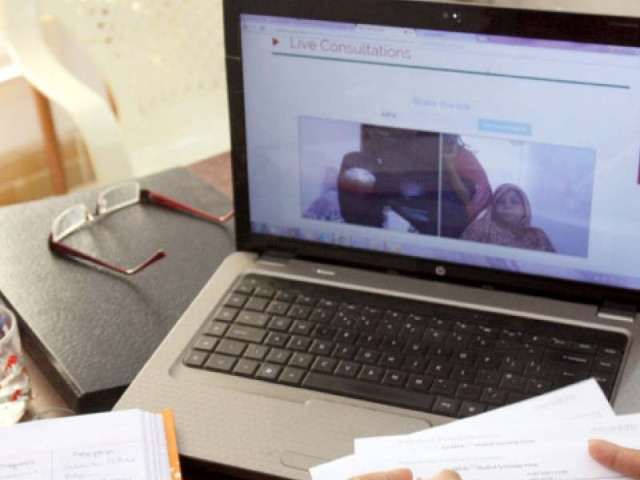From ‘doctor brides’ to practicing physicians
The doctHERs concept was first tested in Sultanabad, Karachi

The doctHERs initiative allows female doctors to consult patients via Skype, thereby serving people who do not have access to quality health care. PHOTO: COURTESY DOCTHERS
Pakistan's healthcare reality is made up of strange numbers; 70% of the students in medical schools are females but only 23% of the registered doctors are women. An innovative project doctHERs is attempting to bridge this colossal gap by bringing female medical graduates, who either get married right after finishing school or quit after having a baby, back into the workforce.
A brainchild of Dr Sara Khurram, who had to quit residency midway because she was expecting her first child, doctHERs targets Pakistan's 'doctor brides', enabling them to work from home and at the same time, serving people who don't have access to quality healthcare.
"At its economic simplest, the doctHERs model is all about connecting the unmet demand for quality healthcare to the untapped supply of home-based female doctors," explained the co-founder of doctHERs, Dr Asher Hasan. "Using technology to address market failures and directly matching supply to demand is exactly what Uber is doing and you can see its impact."
The doctHERs concept was first tested in Sultanabad, Karachi, in 2014 with the small grant money, won in the international entrepreneurial competition, Ashoka Changemakers. "I consulted 100 antenatal patients in six months remotely via Skype and referred seven of them to hospitals for safe deliveries," shared Dr Khurram. Winning the top prize in another competition, REC@NNECT, was the defining moment for her and she knew doctHERs had to be made into an operational company.
With two fully functional clinics in Karachi and one soon-to-be inaugurated in Mansehra, doctHERs wants to upgrade all existing healthcare units by introducing telemedicine. Their clinics have a nurse, two home-based doctors and a specialised video consultation setup that facilitates doctor-patient interaction.
The first clinic in Karachi's Model Colony was built inside a house gifted to doctHERs after the government and private organisations refused to let their clinics be used for the project. Since it started in May this year, the clinic has consulted 1,300 patients and conducted six medical camps.
The prototype in Sultanabad and inaugural clinic in Model Colony were relatively easier feats for the doctHERs team, considering the challenges they faced in Hijrat Colony. "It is a very conservative, challenging society," Dr Khurram shared her experience. To achieve their target in the area, the team persuaded community elders, conducted workshops in schools, surveyed houses from door to door and established medical camps.
The clinic in Mansehra is their first pan-Pakistan venture and they are eager to see what can and cannot be done, when the doctHERs core team is not physically present in the area. "We need this experience for our rural expansion plan," she stresses.
Not in favour of making doctHERs a charitable venture, Dr Khurram and her team are determined to have a sustainable business model. "We charge Rs100 as fee per patient. From this, Rs50 goes to the doctor, Rs25 to the nurse, Rs15 covers the operational expenses and Rs10 is the doctHERs service fee," she breaks down the numbers, stating that not having to pay rent keeps their expenses low. The team has also introduced value-added services such as blood pressure and glucose tests and a mini pharmacy to increase earnings.
Dr Khurram points out that her doctors do one-third of the work a resident does in Pakistan's government hospitals and earn half as much. But she believes these doctors don't come for the money. "They are working to fulfill the oath they take at medical schools; for them it is about the thrill of seeing patients get better and being the centre of the clinic," she shares.
Breaking multiple barriers and defying limitations, the doctors in Karachi's clinics are consulting patients from their houses in Chakwal, Quetta and London. By 2017, doctHERs plans to expand to eight community clinics in underserved areas, 15 clinics for corporate employees and ten retail clinics, says Dr Khurram.
By 2020, Dr Hasan adds, the team envisions to have impacted over five million lives (directly or indirectly) in Pakistan and the idea replicated in at least two or three other emerging markets.
Published in The Express Tribune, October 9th, 2015.


















COMMENTS
Comments are moderated and generally will be posted if they are on-topic and not abusive.
For more information, please see our Comments FAQ